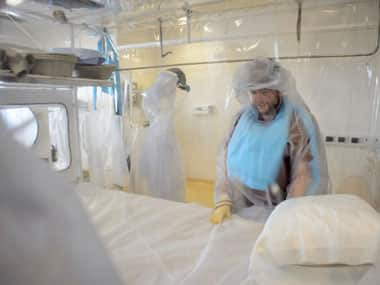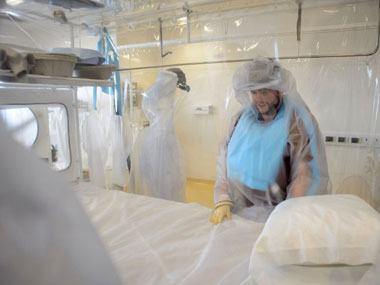The Ebola outbreak in West Africa, which has claimed more than 900 lives in a span of a few weeks, has been till now restricted to Liberia, Guinea, Sierra Leone and Nigeria. Outside Africa, one infected person had travelled to the US and had been quarantined for treatment and was being treated in Atlanta. Yesterday, another woman suffering from Ebola was flown to Atlanta from Liberia after a serum administered to her seemed to slow down her degeneration. Understandably, the outbreak has sent other countries to a tizzy. India, which has around 45,000 people working in the countries affected by Ebola, is preparing for the event of its citizens returning home in case the outbreak worsens. Union Health Minister Dr Harsh Vardhan made a statement in Parliament to this effect. A report on
The Times of India
states: “Vardhan said 500 Indians were in the Republic of Guinea, 3,000 in Liberia and 1,200 in Sierra Leone, from where the maximum cases have been reported. Nigeria has a much larger presence of nearly 40,000 Indian citizens.” The report points out that 300 CRPF personnel are also posted in Liberia as a part of the UN Peacekeeping forces. [caption id=“attachment_1653629” align=“alignleft” width=“380”]
 A nurse wears protective clothing as he demonstrates the facilities in place at the Royal Free Hospital in north London on August 6, 2014, in preparation for a patient testing positive for the Ebola virus. AFP.[/caption] The information is alarming, especially when viewed in the context of a WHO report that the outbreak in West Africa has affected 1,603 people sick, with 887 of them dead. The TOI report states that India is mulling preventive measures in case any Indian contracts the disease and has to return. The infection, experts believe, was sparked off by being in proximity to wild animals like chimpanzees, antelopes and fruit bats - found in abundance in West Africa. “Ebola is highly infectious. It can be transmitted through contact with the blood, bodily fluids and organs, including skin, of sufferers or through indirect contact with environments contaminated by the disease,”
observes CNN
_._ While the spread of the infection can be stopped, it requires isolation of the infected patient with great alacrity. According to the Associated Press: “Isolating anyone with symptoms while testing is done, taking precautions while providing them medical care and tracking down anyone they were in close contact with when they got sick. Those who have had direct contact with an Ebola patient are advised to take their temperature twice a day for three weeks, the incubation period for the disease. If they show symptoms, they should then be isolated and tested.” Therefore it becomes clear that apart from constant monitoring, the country’s health machinery has to be strong, and its health force adequately trained to deal with an infection this dangerous. That is probably where India might falter if it were to deal with an infection. An article on
Vox.com notes
,“There are suspected Ebola cases in Europe, Asia, and North America but none are confirmed. Public health officials are relatively unconcerned about Ebola becoming a big problem in the developed world. That’s because outbreaks persist in countries with poor sanitation and a shortage of resources to contain them, not in resource-rich places like the US.” There’s no denying the fact that what ails the health machinery of Africa and has facilitated the spread of the disease is not too far removed from the problems prevalent in the health infrastructure of India. In fact, the same article notes that the outbreak worsened because the countries didn’t have enough resources to isolate the patients appropriately and treat them. It is not difficult to see that with hospitals overflowing with patients, India has the same handicaps that made the outbreak such a fatal one in these West African countries. However, India, it seems has already swung into action. The TOI report states, “To prevent the disease from spreading to India, the government is taking several precautionary measures — like obtaining details of travellers originating from or transiting through affected countries and tracking them after their arrival, up to their final destination.” However, several medical facilities in the United Kingdom and the United states have already set up fully-equipped treatment centres in case they have to deal with a patient infected with Ebola. No such measures have been reported in India yet. We can hope that the measures bear positive results.
A nurse wears protective clothing as he demonstrates the facilities in place at the Royal Free Hospital in north London on August 6, 2014, in preparation for a patient testing positive for the Ebola virus. AFP.[/caption] The information is alarming, especially when viewed in the context of a WHO report that the outbreak in West Africa has affected 1,603 people sick, with 887 of them dead. The TOI report states that India is mulling preventive measures in case any Indian contracts the disease and has to return. The infection, experts believe, was sparked off by being in proximity to wild animals like chimpanzees, antelopes and fruit bats - found in abundance in West Africa. “Ebola is highly infectious. It can be transmitted through contact with the blood, bodily fluids and organs, including skin, of sufferers or through indirect contact with environments contaminated by the disease,”
observes CNN
_._ While the spread of the infection can be stopped, it requires isolation of the infected patient with great alacrity. According to the Associated Press: “Isolating anyone with symptoms while testing is done, taking precautions while providing them medical care and tracking down anyone they were in close contact with when they got sick. Those who have had direct contact with an Ebola patient are advised to take their temperature twice a day for three weeks, the incubation period for the disease. If they show symptoms, they should then be isolated and tested.” Therefore it becomes clear that apart from constant monitoring, the country’s health machinery has to be strong, and its health force adequately trained to deal with an infection this dangerous. That is probably where India might falter if it were to deal with an infection. An article on
Vox.com notes
,“There are suspected Ebola cases in Europe, Asia, and North America but none are confirmed. Public health officials are relatively unconcerned about Ebola becoming a big problem in the developed world. That’s because outbreaks persist in countries with poor sanitation and a shortage of resources to contain them, not in resource-rich places like the US.” There’s no denying the fact that what ails the health machinery of Africa and has facilitated the spread of the disease is not too far removed from the problems prevalent in the health infrastructure of India. In fact, the same article notes that the outbreak worsened because the countries didn’t have enough resources to isolate the patients appropriately and treat them. It is not difficult to see that with hospitals overflowing with patients, India has the same handicaps that made the outbreak such a fatal one in these West African countries. However, India, it seems has already swung into action. The TOI report states, “To prevent the disease from spreading to India, the government is taking several precautionary measures — like obtaining details of travellers originating from or transiting through affected countries and tracking them after their arrival, up to their final destination.” However, several medical facilities in the United Kingdom and the United states have already set up fully-equipped treatment centres in case they have to deal with a patient infected with Ebola. No such measures have been reported in India yet. We can hope that the measures bear positive results.
With 45,000 citizens in West Africa, is India ready to deal with Ebola?
FP Staff
• August 8, 2014, 12:48:21 IST
Is India prepared to deal with a Ebola outbreak?
Advertisement
)
End of Article